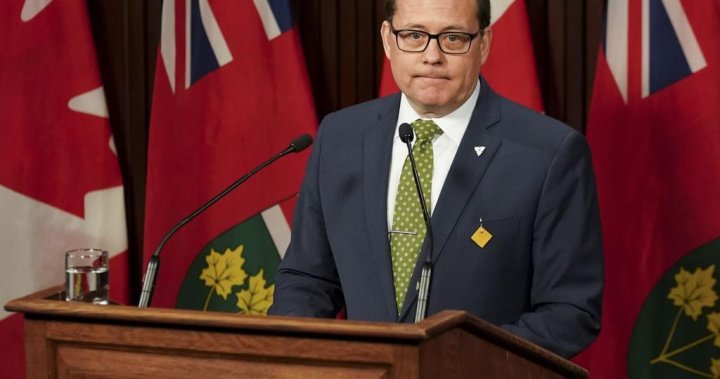Global economies are on edge as the trade war continues, and there’s another sign in financial markets that things may be about to get worse.
Demand for bonds worldwide is cooling down quickly as investors appear put off by the outlook for some major governments to be able to maintain their finances, including the United States.
“There’s general unease around the U.S. government’s fiscal policies, this tariff war, there’s a new spending tax bill that people have some serious questions about, and what it’s going to do to long-term government finances,” says financial expert Clay Jarvis at NerdWallet Canada.
“So I think those doubts are what’s really shaking the bond market.”

The U.S. government currently has a debt of just over $32 trillion, and pays a substantial amount of its revenue, mainly from taxes, on interest payments servicing that debt.
That debt level is expected to increase after U.S. President Donald Trump’s budget bill narrowly approved by the House of Representatives, and set to go to the Senate for a vote next.
Get daily National news
Get the day’s top news, political, economic, and current affairs headlines, delivered to your inbox once a day.
That bill is poised to offer tax cuts, among other spending plans, which may actually be making the U.S. government’s bonds appear less attractive for buyers.
If buyers believe the government will be unable to pay down debt, they might feel less inclined to purchase bonds — especially those with longer terms.
It’s a similar scenario to when a bank denies someone a loan if they have a poor credit score.
Recently, billions of dollars’ worth of longer term 20-year U.S. government bonds were put to auction to generate more revenue, but they didn’t sell as quickly as expected.
As a result, the interest rate on those bonds had to be increased to more than five per cent to attract enough buyers, and led credit rating firm Moody’s to downgrade those bonds.
“When the bond rating goes down, the interest rate that investors require goes up, and becomes harder for the government to finance itself,” says finance professor Andreas Park at the University of Toronto.
“You either finance the government by raising taxes or by taking on more debt, and if you take on more debt, that just spirals up and up.”
In his spending bill, Trump included tax cuts that may actually lead to more government debt.
If the deficit continues to sink, then taxes will actually need to increase to pay off the debt or find another source of revenue.
The analyst downgrade was one of the main contributing factors which lead to a big sell-off on stock markets last week.
“There has been a lot of concern over the U.S. government’s financial position, and maybe it was highlighted by the fact that one of the credit ratings agencies, Moody’s, actually took away the AAA rating of the U.S. government,” says chief economist Doug Porter at the Bank of Montreal.
“That’s actually the third ratings agency that’s decided the U.S. is no longer a AAA-rated entity, and what that’s done is put a little bit more upward pressure on long-term interest. In other words, the U.S. government has to pay even more to borrow money.”
What does that uncertainty actually mean for economies?
That U.S. uncertainty is also part of a bigger international economic picture.
Other developed nations are also experiencing rising government debt, meaning government bonds are generally becoming less attractive as safe investment options overall.
“Investors around the world are basically scrambling to decide where to lend their money,” says Porter.
“I think in general, there is concern about government finances, and we’ve seen not just in the U.S., but in Europe, in Japan, and yes, even Canada, we have seen those long-term interest rates go up.”
When government debt rises and more effort goes into paying it down, that can lead to less money being available to spend on services to citizens or on programs that are not viewed as priorities.
That can signal more potential pain for consumers, who may decide to pull back on spending plans, said Jarvis.
“It would be maybe a warning sign that a government is engaging in some fiscal decisions that could impact its ability to pay for services or lead it to cut spending on social programs,” he said.
Investors can shop around for the best deals if they want to buy bonds and by comparison to the United States, Canada’s bond market may be considered a safer option for many.
“Foreign investors are actually still fairly confident in Canada,” says Porter.
“We’ve got somewhat lower inflation, a weaker economy, but better government finances overall. So all those keep Canadian yields a little bit lower than they are in the U.S.”
For Canadians, that uncertainty comes just ahead of the Bank of Canada’s next interest rate decision next week, which will impact everything from the cost of mortgages to borrowing costs for bonds.
The most recent report from Statistics Canada showed that Canada’s inflation outlook may be leaning towards another pause on the rate cycle on June 4.
© 2025 Global News, a division of Corus Entertainment Inc.





